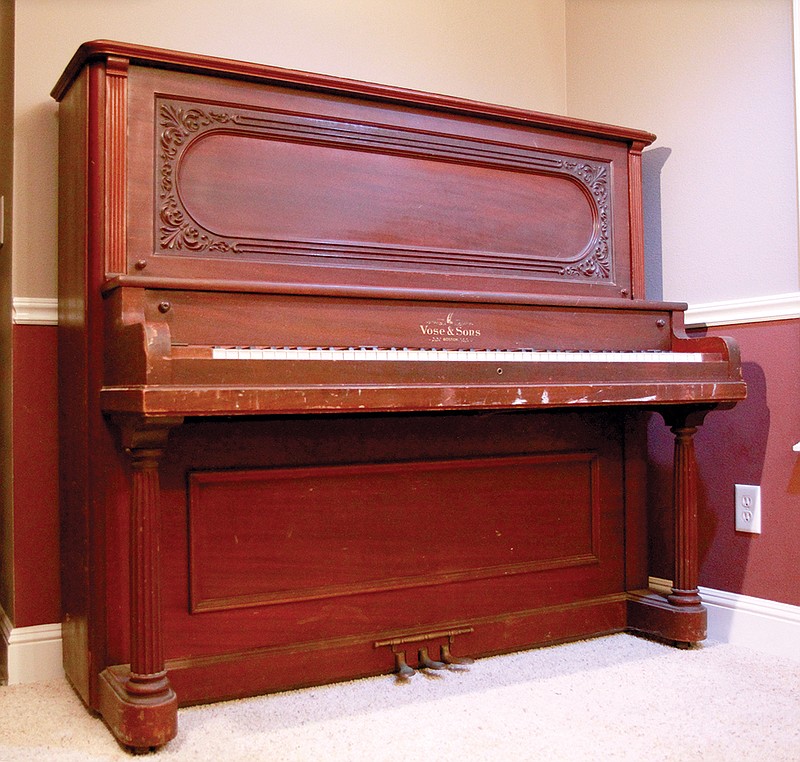When filmmaker John Baxter’s wife, Suzie, inherited an old piano from her aunt, the couple discovered that the instrument was linked to a story of murder and revenge that he wants to tell in a documentary.
The piano has also inspired the plot for a feature film he wants to make, based on the idea that the old upright is haunted.
“The piano originally belonged to the only daughter of a Hot Springs judge, a young girl who died 100 years ago this week,” said Baxter, who lives in Bentonville, but is a native of Hot Springs. “I discovered this incredible story. The judge’s daughter was allegedly brutally murdered by a hired worker for the family. He was captured, but a mob took him from outside the jail and lynched him.”
On the morning of June 19, 1913, 14-year-old Garland Huff, the daughter of Judge C. Floyd Huff, was presumably attacked by Will Norman.
“From what I have gathered, he was a cook for the family and may have been what they called slow,” Baxter said.
Norman didn’t get along with the girl, according to the family story. He bashed her head in with a potato masher and put her in a china cabinet and fled, Baxter said.
Found by her younger brother, she was still alive but died later in the day.
What followed was reported the next day in the Hot Springs Sentinel-Record: “The incident marked the day of greatest excitement ever known to the history of Hot Springs.”
Informed by extra editions of the newspaper, hundreds of armed men gathered for a large manhunt on West Mountain.
However, Baxter said, a renowned fox hunter and friend of the judge, Tom McCafferty, started looking for Norman in another direction. Norman was found by McCafferty and Ernest Sims on Cedar Glades Road.
Working with sources from the newspaper and the Garland County Historical Society, Baxter said as many as 500 people followed the two men and their African-American prisoner to the jail in Hot Springs. On the trip into town, accounts state, Norman told his captors that he “didn’t mean to kill her, but she screamed.”
“That is when Norman told them, ‘I’ll be dead in a little while,’” Baxter said.
When the three men arrived at the jail, they found many more men, some of whom had returned, armed, from the search of the mountain.
“The crowd swarmed the buggy and took Norman to a light pole at the corner of Ouachita and Central avenues, and he was hanged,” Baxter said. “But he was dead before they could lift him up because people started shooting him.”
The newspaper account said as many as 5,000 people watched the lynching, with some residents arriving by streetcar, once word was out about the capture. The mayor of Hot Springs arrived and asked the crowd to disburse, but they did not leave until the body was burned nearby.
Baxter now wants to do a documentary about the two deaths as part of his hometown’s history.
“It is just as fascinating as any story that might come out of Hollywood,” he said. “This is an Arkansas story, and I think Arkansans should tell it.”
Patti Keahey of Hot Springs, a great-granddaughter of Judge Huff, provided some of the materials for the documentary.
“My father’s grandmother married Mr. Huff,” Keahey said. “My mom saved a lot of pictures from Mrs. Huff, Garland’s mother. I have what might be the only picture that exists of Garland.”
Keahey said she is excited about being involved in the research on the documentary. She said she recently heard that the production was looking for automobiles from the period and clothing from around 1913 to make the documentary more authentic.
“I’m excited to see the film when it is finished,” she said. “I hope it will be shown at the Hot Springs Documentary Film Festival so locals can see it. Maybe someone will know about something passed down about a relative who was part of the story.”
The piano becomes a part of the story because it had been purchased by the judge for his daughter, and it was in the room where the girl was killed.
“At sometime in the 1930s, the judge hosted a party at his home, and he allowed a young lady to play his daughter’s piano,” Baxter said. “The judge then gave the piano to the young woman. That was my wife’s aunt’s mother, and now we have the piano.”
His wife’s family knew part of the story of the piano and the Huffs, but Baxter wanted to know more.
“When we brought the piano into the house, my wife was unnerved by it,” Baxter said. “Just knowing it belonged to this girl who was murdered was a little spooky.”
The idea of a ghost in the old piano sparked Baxter to develop a story of paranormal activity, he said.
“What if the piano was a ‘Pandora’s box’ of sorts, channeling these tormented spirits?” he asked. “It is all based on a real story rich with drama and tragedy.”
Baxter is an Emmy-nominated producer and director and will hold those same jobs for his fiction movie that he has named The Ivory Curse. He has written the script with co-writer and actor Clayton Bowman. Baxter’s wife, Suzie, who is experienced in choreography, show production, costumes and set design, also is involved in the production.
Baxter is looking for funding for both productions, with the documentary to come first.
For more information about Baxter and his two productions, contact him at info@ivorycurse.com.
Staff writer Wayne Bryan can be reached at (501) 244-4460 or wbryan@arkansasonline.com.
